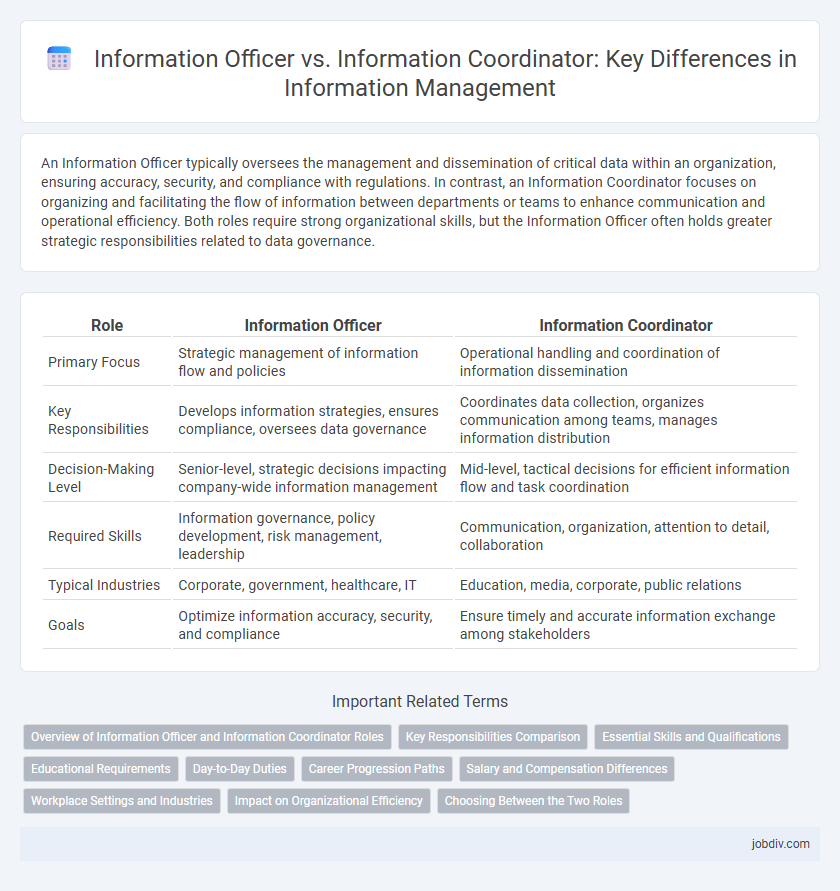An Information Officer typically oversees the management and dissemination of critical data within an organization, ensuring accuracy, security, and compliance with regulations. In contrast, an Information Coordinator focuses on organizing and facilitating the flow of information between departments or teams to enhance communication and operational efficiency. Both roles require strong organizational skills, but the Information Officer often holds greater strategic responsibilities related to data governance.
Table of Comparison
| Role | Information Officer | Information Coordinator |
|---|---|---|
| Primary Focus | Strategic management of information flow and policies | Operational handling and coordination of information dissemination |
| Key Responsibilities | Develops information strategies, ensures compliance, oversees data governance | Coordinates data collection, organizes communication among teams, manages information distribution |
| Decision-Making Level | Senior-level, strategic decisions impacting company-wide information management | Mid-level, tactical decisions for efficient information flow and task coordination |
| Required Skills | Information governance, policy development, risk management, leadership | Communication, organization, attention to detail, collaboration |
| Typical Industries | Corporate, government, healthcare, IT | Education, media, corporate, public relations |
| Goals | Optimize information accuracy, security, and compliance | Ensure timely and accurate information exchange among stakeholders |
Overview of Information Officer and Information Coordinator Roles
Information Officers manage the collection, analysis, and dissemination of data to support organizational decision-making, ensuring accurate and timely information flow. Information Coordinators oversee the organization and distribution of information resources, facilitating communication between departments and maintaining data consistency. Both roles are essential in optimizing information management processes, with Officers focusing on strategic data handling and Coordinators emphasizing operational coordination.
Key Responsibilities Comparison
Information Officers manage the overall flow of information within an organization, focusing on strategic communication, data governance, and ensuring compliance with information policies. Information Coordinators primarily support these efforts by organizing, categorizing, and maintaining information databases, facilitating seamless access and distribution to relevant stakeholders. Key responsibilities for Information Officers include policy development and stakeholder communication, while Information Coordinators concentrate on data management and operational support.
Essential Skills and Qualifications
Information Officers require strong analytical skills, excellent communication abilities, and proficiency in data management systems to effectively oversee information dissemination and ensure data accuracy. Information Coordinators need organizational expertise, attention to detail, and experience with database maintenance to streamline information flow and support operational efficiency. Both roles benefit from qualifications in information technology, data analysis, or communications, but Information Officers typically demand advanced problem-solving skills and strategic planning capabilities.
Educational Requirements
Information Officers typically require a bachelor's degree in information management, computer science, or a related field, with emphasis on data analysis and information systems. Information Coordinators often hold a degree in communication, library science, or education, focusing on organizing, disseminating, and managing educational materials. Both roles benefit from certifications in information technology or project management to enhance their expertise and effectiveness in handling educational information.
Day-to-Day Duties
Information Officers manage the strategic flow and accuracy of information across departments, ensuring compliance with data governance and regulatory standards. Information Coordinators focus on organizing, updating, and distributing data within teams to maintain efficient communication and operational support. Both roles require strong data management skills, but Information Officers emphasize policy implementation while Information Coordinators prioritize logistical information handling.
Career Progression Paths
Information Officers often begin their careers managing data quality and ensuring accurate information dissemination, progressing to senior roles such as Information Managers or Data Governance Specialists. Information Coordinators typically start by overseeing daily data workflows and coordinating between departments, advancing toward positions like Project Manager or Information Systems Manager. Both career paths emphasize developing expertise in data management, communication skills, and strategic planning to enhance organizational information flow.
Salary and Compensation Differences
Information Officers typically command higher salaries due to their strategic role in managing organizational information systems and ensuring compliance with data regulations. Information Coordinators generally earn less, as their responsibilities often center on organizing and disseminating information rather than overseeing complex data governance. Salary ranges for Information Officers vary between $60,000 and $90,000 annually, while Information Coordinators usually fall within a $40,000 to $60,000 compensation bracket.
Workplace Settings and Industries
Information Officers typically operate in corporate, government, and healthcare settings, managing data governance, compliance, and strategic communication. Information Coordinators are often found in educational institutions, non-profits, and event management industries, focusing on organizing, distributing, and maintaining information flow. The workplace of an Information Officer demands high-level decision-making and policy development, whereas Information Coordinators excel in administrative support and operational coordination.
Impact on Organizational Efficiency
An Information Officer streamlines data management by implementing strategic information policies that enhance decision-making processes, directly boosting organizational efficiency. In contrast, an Information Coordinator focuses on organizing and maintaining information flow between departments, ensuring accurate and timely communication that supports operational productivity. Both roles contribute significantly, yet the Information Officer's strategic oversight typically drives broader efficiency improvements across the organization.
Choosing Between the Two Roles
An Information Officer typically manages data governance, oversees information security, and ensures compliance with regulatory standards, making them ideal for organizations prioritizing data integrity and legal adherence. An Information Coordinator primarily focuses on organizing, distributing, and facilitating access to information across departments, which suits businesses needing streamlined communication and collaboration. Selecting between these roles depends on whether the organization's priority lies in strategic information management or efficient information flow and coordination.
Information Officer vs Information Coordinator Infographic

 jobdiv.com
jobdiv.com